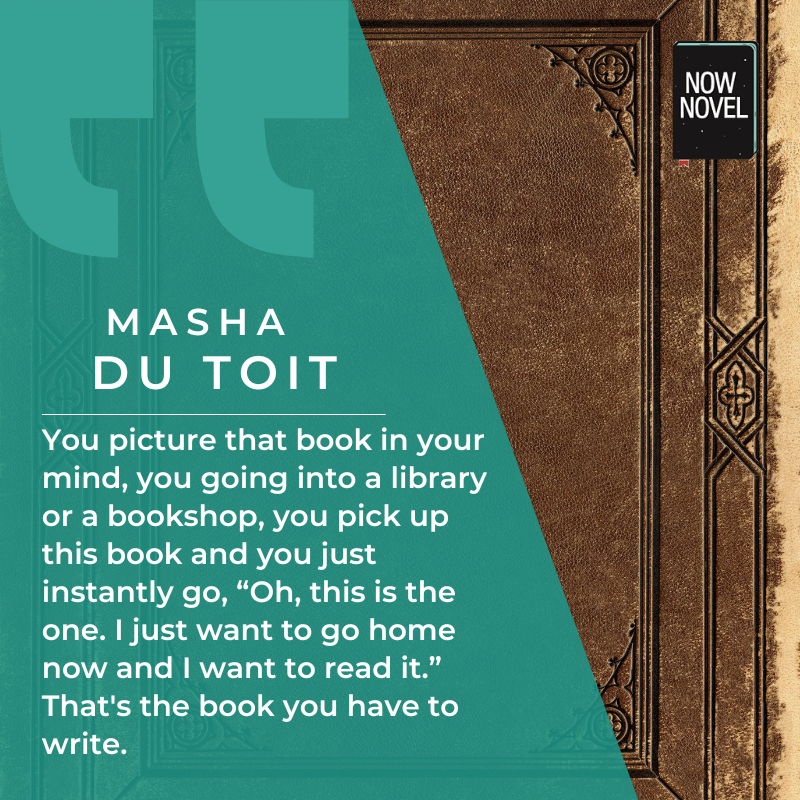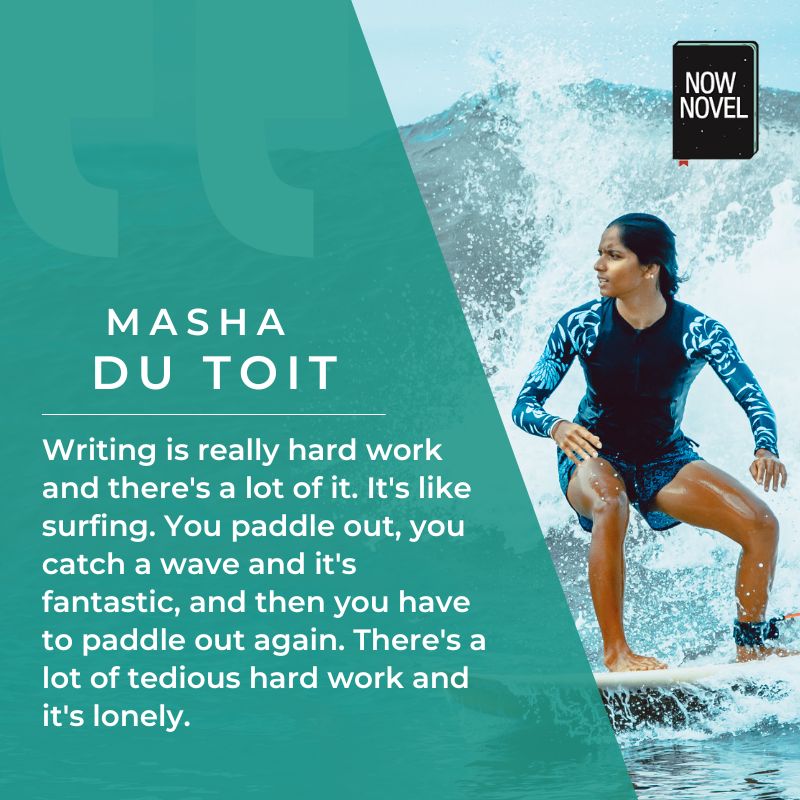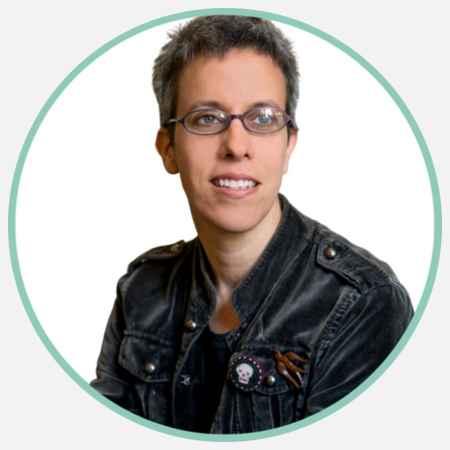Watch the video or read the full transcript of this writing coach chat below:
Working with writers
Brendan: Hi Masha, thanks for taking the time to chat to us today. We wanted to find out a little bit more about you so we can share this with the rest of our community who want to know more about our coaches. So, I’m going to start off with a fairly easy one and ask, what is your role in Now Novel? What do you do?
Masha: Okay, so I’m a coach at Now Novel. I work with writers and I help them create stories. Writing has got such a lot of different aspects to it. Some of it would be just like getting the story itself working, ensuring the story flows nicely, all of that kind of stuff. And some of it will be the actual mechanics of the language. So yeah, it’s a big job indeed.
Brendan: Thank you, we appreciate it. I know that you have written a series in the past and I was wondering if you’ve got any tips for us on how to write a series or any secrets about that?
Tips for writing a series
Masha: Yeah, so writing a series is actually something that a lot of people are very interested in, especially if you’re self-publishing your books. People who write genre fictions, like fantasy, science fiction, mysteries, or romance, have voracious readers who fall in love with the characters and with the world that you’ve created. They want to know what happens next, so when the book is over, you’ve got to write another one. Writing a series is something to keep in mind and it can be a little bit tricky. You write the first book, make all these decisions about what the characters do and what the rules of the magic system are, and then you publish it. Lots of people read it, hopefully, and then you have to write the next book and suddenly you can’t remember why certain things happened or what the name of that person’s aunt was. It can be a bit of a pain. One of my tips would be to keep a sort of a ‘Book Bible’ where you write down all of the things that might become important in the next book. Another tip is to write the whole series and publish it all at once so that you can go back and change things because everybody makes mistakes.
Brendan: I can imagine. It’s also hard to predict the impact of things when you’re plotting out over an expected three or four book series or even longer.
Masha: Yes, you write a story and a book that comes to a nice, neat ending, but most people want to know what happens next. The story comes and then there’s always new stories starting and you just start thinking, “Yes, but what happened to this one? Did that marriage work out? Did the dragon die?” You want to know what happens next so always just keeps going.

Writing inspiration
Brendan: Great. So, aside from your previous stories that you’ve written, what do you find as your greatest writing inspiration? What is the source of that?
Masha: Obviously, other books are a great source of inspiration, but actually any kind of story, whether it’s a TV series that I’m watching, a movie, or even sometimes an advertisement or something, anything that catches my attention. I realize it’s affecting me, whether it is that I really dislike a character or I feel really curious about what’s going to happen next. As soon as I find that, I think, “Oh, how did they do that? How did that character in a TV series make me feel passionate about wanting to know what happens next or caring about that character?” And you can kind of break it down from there.
You can break it down into mechanical things like, “Does this character remind me of myself? Is this something I’m jealous of them for? Am I feeling insecure? What’s going on?” So, in terms of writing, you’re actually learning about storytelling.
One of my tips would be to keep a sort of a ‘Book Bible’ where you write down all of the things that might become important in the next book.
Tweet This
Keeping track of ideas
Brendan: You actually know a lot about yourself as well. Masha, do you have a way of taking that? If you find something that piques your interest, do you write it down? Do you keep a book? Do you have a big file on your computer that talks about, “This is a character, this is an inciting incident?” How do you actually take that inspiration and make it accessible to you?
Masha: Good question. That’s also something that’s going to be very different for different people because everybody’s brain works differently. Some people really like having a little notebook with them. As soon as they think of something, they write it down. I’m just not that organized. What I do is, I kind of have faith that if it’s an important enough idea, I will remember it. So, I just kind of try and keep track of the things that I feel passionate about. But when I do sit down at my computer and I open a writing project, the first thing I do is usually to write down, “Oh, think about the rabbit,” or whatever it is. Then I can go back to that and remember what I want to do.
On training as a visual artist
Brendan: It’s somewhat allied to that. You are multi-talented in that you illustrate as well as write. How do those bits fit together? I’m not an illustrator or a designer. I don’t really think in pictures. But do you, especially working within a realm that is quite fantastical think in pictures first? Do you draw pictures first? Is there any interplay between that?
Masha: That’s a very interesting question. I used to be trained as a visual artist. I didn’t think of myself as a writer even though I’ve been a writer all my life. I realized that relatively late. My first few books, I illustrated my books and gradually, as I went along, the illustrations became less. But I still draw as part of my writing process. I will, for instance, draw a portrait of a character partly to figure out what they look like but also partly just because when you draw, you use a different part of your brain and it can kind of free you up to have new ideas. But I’m also a very visual person. I have a capacity to imagine visual scenes and put myself in my own visual imagination. That’s my writing process. I kind of pretend that I’m sitting in the tower and there’s a rose bush over there. I can smell it. I can feel the air moving and all of those sorts of things. So, it’s very much a visual, tactile process for me which is going to be different for different people. It really depends on what kind of brain you have.
Brendan: That’s interesting because mine does not think like that. I think I’d probably be more plot-driven.
Masha: And that’s perfectly fine. It’s just different. There isn’t a right way to do it. You’ve got to figure out what works for you.
Brendan: Of course. In terms of that, how does that play into cover design and things like that? Do you design your own covers or are you the world’s worst project manager around that?
Cover design
Masha: Cover design is interesting because now my books are self-published. So, cover design is part of the more commercial side of it. The books are not just for myself. I want to find readers and cover design, the cover of the book, is sort of like a little advert where you try to very quickly communicate what kind of book it is, like the genre.
Brendan: For example, if you write a self-help book and it looks like a murder mystery, you’re going to get some very disappointed readers. So, there’s a sort of a commercial, almost calculated design aspect that comes to it.
Masha: Yes, and also because I design my own covers, I can get away with quite a lot of things. It’s fun but it’s actually remarkably difficult because you only get one chance.
Brendan: I can imagine. You’re trying to communicate the whole ethos of 80,000 words while also showcasing that it’s a cozy mystery, and it’s young adult, and whatever. So, you’ve got to use the signifiers while being alluring at the same time. It’s a contradiction because you want the book to look familiar so people can recognize what it is, but it also must look different because it doesn’t look just the same and boring like everything else. So, it’s a bit of a balancing act.
Masha: Yes, that’s a good way to put it.

Best piece of writing advice
Brendan: So, I’m going to turn it back to the writing side of things. What is the best piece of writing advice you’ve ever received?
Masha: There’s a lot of writing advice out there, you can completely drown in it. If you’re listening to writing advice and you start getting that feeling like, “I don’t really know if I want to write, maybe it’s not for me,” then that advice is bad advice for you. People are different and people write differently. Some people have children, some people have very busy lives, some people struggle to write verbally. You’re going to learn what works for you. The other thing that I wanted to say is that you have to write the book that you would just love to read. That’s the most important thing to keep in mind. You picture that book in your mind, you going into a library or a bookshop, you pick up this book and you just instantly go, “Oh, this is the one. I just want to go home now and I want to read it.” That’s the book you have to write.
Brendan: That’s interesting. And what are the attributes of the book? How would one know what that is?
Masha: That’s self-knowledge. You have to some extent look at what kind of writer you are. I’m not really a commercial writer. Some people are going to be very much about studying the markets and figuring out what’s popular at the moment. I don’t really do that. It’s not that one is better or worse than the other, it’s just that I’m not good at it. So, I’m playing to my strengths. I write for myself and then I will just sort of go into that space of realizing, “Oh, I really like stories about…” You fill in the dots for yourself. Writing is really hard work and there’s a lot of it. It’s like surfing. You paddle out, you catch a wave and it’s fantastic, and then you have to paddle out again. There’s a lot of tedious hard work and it’s lonely. So, you have to find a way of making it really interesting and exciting for yourself so that you believe in your own projects and you don’t kind of go like, “Why am I doing this? I’m sitting here alone by myself writing a book that nobody’s probably ever going to read because it’s so boring because I don’t even want to read it.”
Coaching other writers
Brendan: That’s great advice, Masha. One more question for you. In terms of those pieces of advice, how do you use them? How do you make them practical for other writers, for people you’re coaching? How do you infuse people with that and how do you help people to see that?
Masha: That’s a good question. The first piece of advice is that you need to have enough self-knowledge to realize whether the advice you’re listening to is good for you. Coaching is going to be a bit of a give and take where I’m figuring out who you are and what your goals are. I need to find out what you’re trying to achieve, what kind of book you’re trying to write so that I understand what you are trying to do. It’s a kind of ongoing conversation as we’re learning about each other and you figure out what my biases are and so on.
The second thing is a very similar one. It’s tricky because sometimes the temptation as a writer is to sort of tell someone, “Oh, I can see this possibility in your book, maybe it should be about this.” That can feel very bad to the person who’s getting the advice because you want to have those ideas yourself. You don’t want somebody else telling you what you should be doing.
So, I try and keep it like this: I’m a teacher outside of this writing coaching as well. I teach people how to do graphic design and things like that. One of the big lessons I’ve found as a teacher is that you can’t really teach people how to do anything. You can only really create a space for them to teach themselves. So, to create a space where you feel safe, unjudged, and inspired, that’s my job as a writing coach.
Brendan: Masha, that was a lovely way to end it. I think creating the space and giving people the opportunity to believe in themselves and their own writing is really important. Thank you.
Masha: You’re welcome, Brendan. Thank you.
- Masha is of the numerous women SFF authors that Nerine Dorman lists in her post on women SFF authors you should be reading.

Masha is a published writer of fantasy and science fiction, and has extensive experience mentoring writers. She has spent more than twenty years teaching the creative use of technology for storytelling at institutions such as the University of Cape Town, Vega, and Stellenbosch University and recently mentoring young writers for the Fundza Literacy Trust. Two of her books have been shortlisted for the Nommo Awards for Best Speculative Fiction by an African writer.

